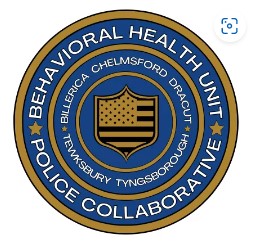The Front Line Initiative Changes Name to Behavioral Health Unit Police Collaborative
 Tewksbury Police Chief Ryan Columbus, Chelmsford Police Chief James Spinney, Tyngsborough Police Chief Richard Howe, Dracut Police Chief Peter Bartlett and Billerica Police Chief Roy Frost are pleased to report that the Front Line Initiative is now the Behavioral Health Unit Police Collaborative.
Tewksbury Police Chief Ryan Columbus, Chelmsford Police Chief James Spinney, Tyngsborough Police Chief Richard Howe, Dracut Police Chief Peter Bartlett and Billerica Police Chief Roy Frost are pleased to report that the Front Line Initiative is now the Behavioral Health Unit Police Collaborative.
From 2016, the Billerica, Chelmsford, Dracut, Tewksbury and Tyngsborough Police Departments have worked to create a regional mental health collaborative aimed at diverting individuals with mental health and substance misuse disorders from being unnecessarily processed through the criminal justice system or through already overcrowded emergency rooms.
The collaborative, funded by a grant from the Department of Mental Health, is changing its name to reflect a revamped and more focused mission of integrating law enforcement and behavioral health utilizing evidence-based best practices that reflect a co-response model.
The Behavioral Health Unit Police Collaborative will provide member departments with access to a co-response clinician who can respond to active calls for service, follow up with individuals post-crisis, and make referrals to community-based services.
Fully embedded into each department, the program provides a trauma-informed, highly trained co-response clinician for individuals experiencing a mental health or substance use crisis.
“Mental Health, Substance use and Crisis management are three consistent challenges that we regularly encounter in our profession,” said Chief Frost. “Having the staff and resources that this collaborative offers, coupled with the financial support provided through the Department of Mental Health, our mission of enhanced public safety and community engagement is best realized.”
“This program allows us to service those in crisis in real time,” Chief Bartlett said. “Having our clinicians responding to mental health calls with officers is a game changer and that added piece is allowing us to get services started from the onset of crisis.”
In addition to on-scene responses, the clinicians are:
• Accessible to police 24/7 for mental health consultation
• Available to community members for follow up with police
• Available for follow up with individuals post-crisis
• Able to make referrals for community-based services, such as for non-acute levels of care and case management
• Supporting community initiatives for better health, wellness, and mental health
“I am incredibly proud of this organization which continues to be ahead of the curve in offering our communities free, 24-hour access to mental health and substance use services, said Chief Howe. “This includes clinician co-response with police officers, which is an innovative and modern approach to law enforcement and promotes alternatives to arrest which is a benefit to all those affected.”
“This collaborative is more important than ever because all of our departments are dealing with increased numbers of calls for services regarding mental health and substance misuse,” said Chief Spinney. “This collaborative enables us to respond to those calls for service with professionalism, compassion, and resources that can help people overcome mental health and substance misuse issues, instead of just heading into the criminal justice system.”
“I am extremely proud of what has been built here and the work that is continuing, leading the way in the Law Enforcement profession,” said Chief Columbus. “Being able to help people in a mental health crisis and providing them with the appropriate resources has changed outcomes and lives for the better.”
